WEEasked some simple questions — and your neighbors, friends, co-workers, acquaintances, even some strangers, answered. Get to know them a little bit better with our fun series, “WEEasked.” Look for it a couple of times a month, most likely on Mondays. Do you have someone you’d like to see featured? Send us an email to weelunk@weelunk.com, and please be sure to put WEEasked in the subject line.
In 1977, the Linsly Military Institute was on the cusp of change. Longtime Headmaster Basil Lockhart had recently retired and, in the wake of the Vietnam War, military school enrollment had declined across the country.The newly installed Linsly board president Dr. Don Hofreuter knew a change was needed and that a strong leader would be necessary to shepherd that change. He crafted a letter to Jack Pidgeon, esteemed headmaster at Kiski Prep, asking if there was anyone on the staff who Pidgeon thought would be interested in the position.
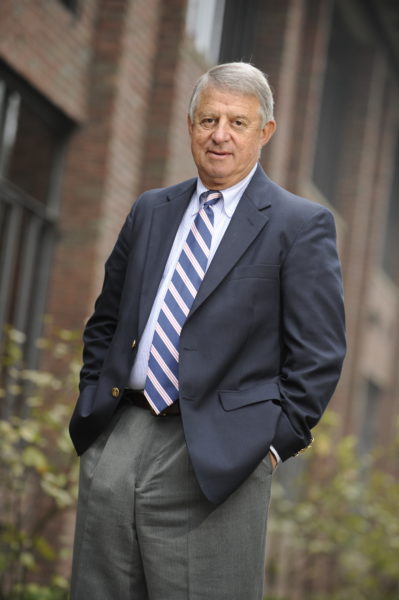 Pidgeon passed the information on to Reno DiOrio, a Kiski alum and faculty member at the time. He said to me, “Even if you aren’t interested in the job, it would be a good opportunity to sharpen your interview skills for the future,” recalls DiOrio. He took the advice and visited the Linsly campus just after Thanksgiving that year.
Pidgeon passed the information on to Reno DiOrio, a Kiski alum and faculty member at the time. He said to me, “Even if you aren’t interested in the job, it would be a good opportunity to sharpen your interview skills for the future,” recalls DiOrio. He took the advice and visited the Linsly campus just after Thanksgiving that year.
DiOrio says he and Hofreuter hit it off immediately. “Don cleared his schedule that afternoon, and we walked the campus for hours talking,”
“It took five minutes for me to decide this was our guy,” says Hofreuter. “His demeanor and presence were exactly what I felt we were looking for in the next headmaster.”
DiOrio declined the offer. He was content staying at his alma mater and continue working with his mentor Pidgeon.
Hofreuter forged ahead with his pursuit of DiOrio, persistently. He would call him every few months to check in on how life was going. “I also knew he had a close relationship with his mother. I would call her to chat, too, and ask how her son was doing,” says Hofreuter.
In the fall of 1978, Kiski head football coach Reno DiOrio brought his Cougars to Wheeling to battle the Cadets. When he stepped off the bus, he was again met by Hofreuter. DiOrio says, “He told me ‘you got enough assistant coaches to get the boys dressed for the game; take a walk with me.’” The two briefly walked the campus again, discussing Linsly’s needs. DiOrio still wasn’t ready to commit, but Hofreuter said he was starting to come around to the idea.
In December of 1978, the Linsly board, by a narrow margin, voted to put its military presence to rest. On Christmas Eve 1978, Hofreuter called again, and Reno gave him the gift he sought. DiOrio would join Linsly for the ’79 school year.
In much the same fashion as his mentor Pidgeon had done at Kiski, DiOrio set out an aggressive agenda to improve the financial health and facilities of the school. Looking back, Hofreuter says, “Without Reno stepping in when he did, there might not be a Linsly to write about today.”
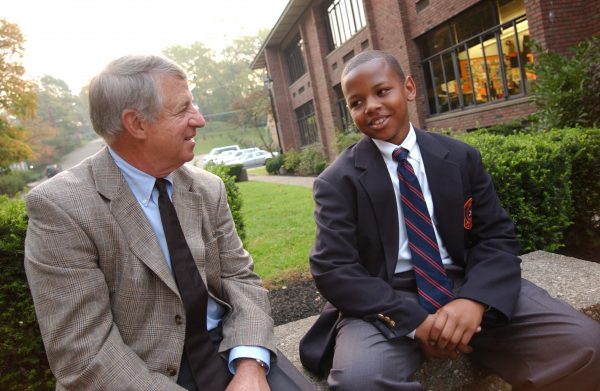
It is without question Reno DiOrio has left an indelible mark on many young men and women from this valley. While many of those Linsly grads have moved on to live elsewhere in this world, many have stayed or returned to Wheeling and contribute to life here.
Mayor Glenn Elliott is one of those Linsly grads (’90) who left and returned. He provided the following thoughts on DiOrio’s leadership: “The best way to lead is by example, and I can say without any shred of doubt that Mr. DiOrio made me a better person during my time at Linsly. There were times when Mr. DiOrio was tough on me. I recall resenting him for it. But in hindsight, it’s clear he knew exactly what he was doing. He pushed you and challenged you to grow. He wouldn’t let you hide within your narrow comfort zone. And he made a lot of us the better for it.”
Here’s what Reno answered when WEEasked:
Would you tell us about your oversight of Linsly moving out of the military realm to a non-military school? Was it a smooth transition? Was it met with objections? What year did that take place? What have been the benefits?
The decision to drop the military aspect from Linsly’s overall program was finalized by the Board of Trustees in December of 1978. In January of 1979, I was appointed Headmaster of Linsly with the specific responsibility to transition from the military school that had been such an important part of Linsly’s tradition for so many years to a college preparatory school for boys. I was not a part of the decision-making process that resulted in Linsly eliminating the military.
I was, however, deeply involved in preparing the groundwork for several major changes that would occur in the opening of the 1979-80 school year. While I did not actually arrive on the Linsly campus until June of 1979, I did make several trips to Linsly as part of the interview process in the fall of ’78 as well as making many trips to Linsly in the winter and spring of ’79 in order to become acquainted with members of Linsly’s Board of Trustees, members of the Linsly administrative team, and many of the faculty members at the school. Those trips were important and enabled me to get to know individuals at the school.
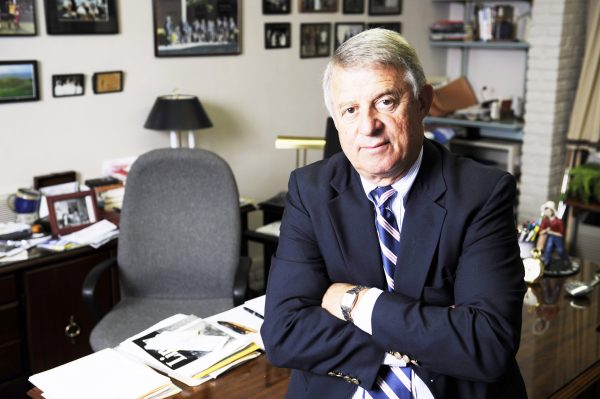 Change is difficult for all of us, but change of the magnitude that Linsly was attempting had the potential to create dissent. There were a number of individuals who welcomed the decision to eliminate the military as part of life at Linsly. Those individuals believed that time spent on strictly military matters could be better used in academic and extracurricular areas. Others, for whom the military was an important part of their Linsly experience, questioned the need to make this significant change. History indicates that military schools were probably at their peak in the ’40s and the ’50s and began to experience change in the ’60s and ’70s when, in fact, many of them either dropped the military part of their school or in some cases, military schools closed. One example of this trend is Greenbrier Military School located in Lewisburg, West Virginia, which had declining enrollment and finally closed their doors in 1971.
Change is difficult for all of us, but change of the magnitude that Linsly was attempting had the potential to create dissent. There were a number of individuals who welcomed the decision to eliminate the military as part of life at Linsly. Those individuals believed that time spent on strictly military matters could be better used in academic and extracurricular areas. Others, for whom the military was an important part of their Linsly experience, questioned the need to make this significant change. History indicates that military schools were probably at their peak in the ’40s and the ’50s and began to experience change in the ’60s and ’70s when, in fact, many of them either dropped the military part of their school or in some cases, military schools closed. One example of this trend is Greenbrier Military School located in Lewisburg, West Virginia, which had declining enrollment and finally closed their doors in 1971.
The large group of Linsly supporters, the majority of them, of course, being alumni, were objective in their views. Instead of jumping to conclusions, they chose to be patient and waited to see what the future held for Linsly. Linsly alumni believed the greatest value in having a military philosophy as a part of the school was the disciplined atmosphere which they believed stemmed directly from the military protocol. My personal experience in independent schools was that many schools achieved that goal, whether they were military or not. The military uniform was, of course, dropped but it was replaced not with casual clothes but with a formal dress code including a blazer, slacks, shirt and tie, and I think that move satisfied many people who initially questioned the change. Over the next decade, alumni could look to the success of the school as proof that the military aspect to Linsly was just one part of a much larger and important formula.
What’s your favorite spot on the Linsly campus?
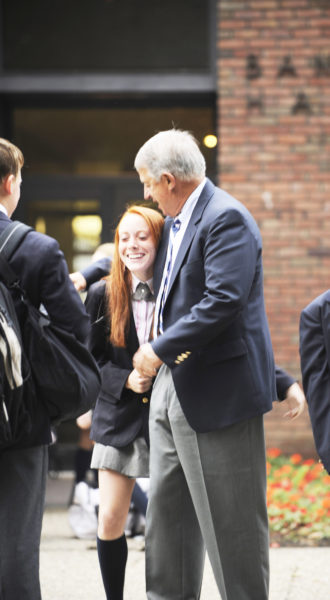
This is an easy question for me to answer: Banes Hall, the school’s primary classroom building. The classroom building is the motor that runs the school. This is where faculty and students come together, where they exchange views and opinions, where respect for different views is learned, where one learns the fundamentals of the background of academic areas, and where during casual time, friendships are formed. All extracurricular activities from sports to art, from music to extravaganza practices add rich experiences to a student’s Linsly experience. But a student spends the majority of his or her time in a school day in Banes Hall. I enjoyed greeting students at the entrance to the school at the beginning of the day and saying goodbye to them as they left for the day.
Between classes, whenever possible, I sat in a chair in the center of the first-floor hallway where there was the most student traffic. Here, I could make comments to a dozen students in the few minutes that it takes for students to change classes.
The head of an Independent School must choose daily how to spend his or her time: budget responsibilities, curriculum questions, parent concerns, and extracurricular programs require thoughtful review, discussion, meetings or action.
While I found time to attend to each of those areas, my focus was, as much as possible, on the development of the individual student. Experienced members of the faculty, coaches and even heads of school are always looking at the individual characteristics of a student. Through daily interaction, these adults can sense which student needs special attention. Providing the specific “attention” required, is one of the most important parts of a student’s overall Linsly experience.
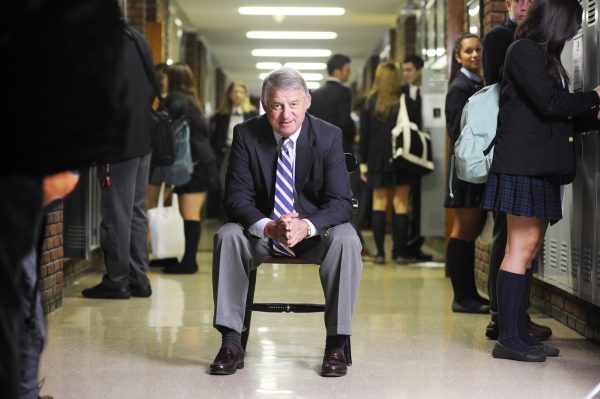 What’s your wish for Linsly?
What’s your wish for Linsly?
My wish for Linsly is that it will continue to grow and provide an excellent educational option for families in the tri-state area as well as our boarding students who currently come from eight states and 20 countries. Linsly was established in 1814 and is one of the 50 oldest Independent Schools in the country. While the majority of schools in this group were established in New England and along the eastern seaboard, Linsly began its history in a frontier town.
In 2014, we celebrated our 200th anniversary and, when one studies the history of this school, you begin to realize how many people were responsible for the school’s survival and its growth. For instance, Headmaster Guy Holden cashed in his personal life insurance policy to enable Linsly to keep its doors open during the Depression. The Linsly Board of Trustees made an excellent selection of Linsly’s current Headmaster, Mr. Justin Zimmerman. Mr. Zimmerman has done a remarkable job in his first five years of studying where changes needed to be made but, at the same time, keeping those values that have always been part of a Linsly education. Justin and Aimee Zimmerman have two children, Jon Michael and Bridget, and their youth, experience and energy have served Linsly well.
Also, leadership at the trustee level is extremely important to Linsly because that body makes decisions that determine Linsly’s future. Over the years, Linsly’s trustees have volunteered their time and energy, as well as their financial support to enable the school to continue to grow. I was extremely fortunate to have Dr. Donald Hofreuter as the chairman of the Board of Trustees during my entire 30-year career as headmaster. He was devoted to Linsly, and his commitment to this school made my job so much easier. Dr. John Holloway is the current president of Linsly’s Board of Trustees and he, too, has provided stable leadership.
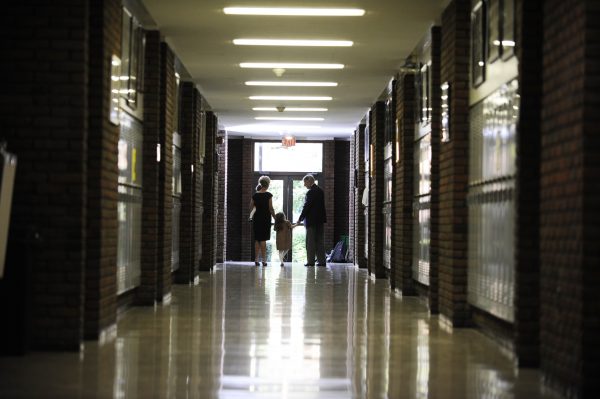
What book is on your nightstand or e-reader right now?
At the present time, I have several books on my nightstand. I am a fan of Winston Churchill, and it seems I always have some Churchill book that I can pick up and read a chapter. I also am reading a book titled, The Other Wes Moore, One Name Two Fates by Wes Moore, which describes the life of two African American youth named Wes Moore, who grew up in Baltimore but had vastly different experiences in their development. And I have always been a reader of mysteries, and at the present time, I am on a Harlan Coben kick.
Where do you take out-of-town visitors?
For Linsly’s 200th anniversary, a book of the history of the school was completed. The author, Mr. Rick Hawley, a former headmaster at University School in Cleveland, visited Linsly on several occasions to research background information on the school. The first time he was here, we went to Figaretti’s restaurant, and every visit after that he insisted that we return to Figaretti’s restaurant. He enjoyed the food, he enjoyed Tony Figaretti, but what Rick enjoyed the most was the atmosphere … it always seemed there was a party going on, and there were no strangers, only friends. I also enjoy Good Mansion Wines (owned by Linsly alumnus Dominick Cerrone ’89), and believe it has been a wonderful addition to Wheeling. I have guests comment that Good Mansion is as good as any similar business in Washington, D.C., Pittsburgh, even San Francisco.
If you could be the best at anything in the world, what would it be?
This is a question I would have answered differently at various stages of my life. When I was a college athlete, I would have given almost anything to extend my career and become an NFL quarterback but, even at age 21, I knew that I didn’t have those skills. As I look back at my career in education, I guess I would say that I would have liked to have been the best in the world when it came to understanding the development of young people, and being able to add to their development in a way that would make them confident, capable and objective members of society. Today, I would be most happy to be a good husband, father and grandfather.
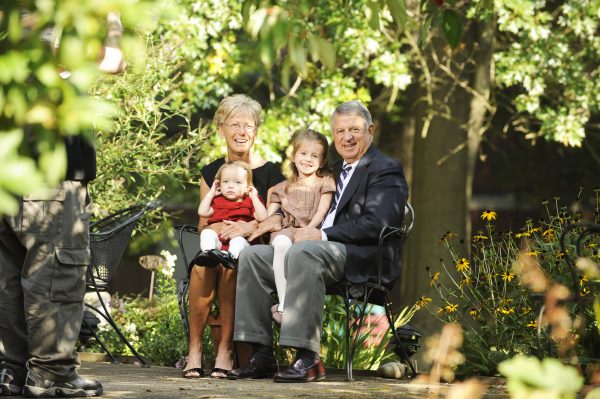
Tell us something that would surprise Weelunk readers about you?
I think those who know me well would agree that what you see is what you get. My friends know that I have been a lifelong Pirate and Steeler fan. I enjoy golf, especially now in semi-retirement as I have more time to play. Perhaps not as many friends know that I am a fan of music from the mid-’50s to mid-’60s and most times when I am working outside or driving in a car, that is what I choose to listen to.
What is your wish for Wheeling?
My wish for Wheeling is the same as my wish for Linsly. I hope Wheeling can continue to grow and flourish. I hope that there are additions to the economy of Wheeling that will create jobs that will enable local college graduates to remain in the area instead of leaving to seek employment. I visit so many Linsly alumni around the country who have important and interesting careers, which were not available in this area when they graduated. Consequently, we have lost young people who could offer so much to the local community. I am encouraged to see some of our young alumni returning to Wheeling or choosing to stay here and am extremely proud of the positive impact that they are having on our city.


